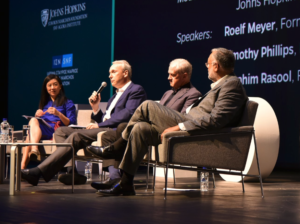Beyond Conflict participates in the Stavros Niarchos Foundation Conference
Tim Phillips, Beyond Conflict Founder and CEOBeyond Conflict participates in the Stavros Niarchos Foundation Conference
By Tim Phillips, Beyond Conflict Founder and CEO
I was honored to be invited with my colleague Mike Niconchuk to participate in the Stavros Niarchos Foundation Conference in Athens, Greece, with a distinguished group of international leaders and activists from the worlds of science, government, technology, the arts, and civil society. We were encouraged to share our work on mental health and resilience with Syrian refugee and migrant communities, and to explore what we can learn from South Africa as we struggle to hold meaningful and constructive dialogues in the United States and Europe at a moment of deepening division.
The conference was organized in partnership with the Agora Institute at Johns Hopkins University, which is funded by the Niarchos Foundation and dedicated to addressing the state of democracy around the world through research and practice.

Beyond Conflict’s participation in the conference will launch a strategic partnership with Agora and Johns Hopkins University to focus on a range of critical global issues, from the threat of growing and deepening polarization in the US to the risk of increasing division and declining trust in democracy and democratic institutions around the world.
I had the honor to speak in a panel on Talking Across Divides with two amazing South African leaders: Roelf Meyer, former minister of Constitutional Affairs, who played a principal role in negotiating the end of apartheid, and Ebrahim Rasool, a top ANC leader whose imprisonment was overseen by Roelf when he was the apartheid minister managing the then state of emergency.
“I had to unlearn so many of my stereotypes because it was comfortable thinking about the apartheid practitioners in terms that are caricatures of them. Until you meet the people, you see their fears, vulnerabilities, and aspirations; then you have to recalibrate your subliminal racism and assumptions about people,” underlined Rasool.
Follow the conversation on Twitter: @Beyond_Conflict and #SNFDialogues